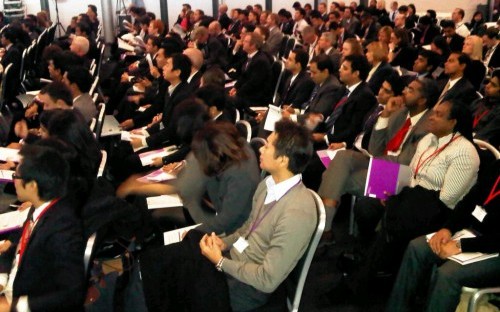The conference - themed "sink, swim or fly: opportunities in a post-recession world" - pulled in an "avalanche" of last-minute delegates, according to organiser Dan Taffler. Heavyweight speakers including the conference chair, Dr Tim Weber, were part of the appeal. Weber is the BBC News Online editor and a media fellow of the World Economic Forum. His introduction to the summit focused on the issue of 'risk' and his experience of witnessing many start-ups and bigger companies navigating the various risks of doing business in today's volatile world.
Michael Parker, a Liverpudlian, and MBA from Manchester Business School, gave the first keynote speech, sharing his personal reflections on the major 'bubbles' of the last few decades. Parker's international business career with Dow, where he rose to become CEO after 30 years with the Chemicals giant, has shaped his view on herd-mentality bubbles.
In 1987 Parker was relocated to Hong Kong having never set-foot in Asia before. He was under pressure to move the regional Dow HQ and re-direct resources to Tokyo, but after several visits to Japan he felt deeply uncomfortable: "the land value of central Tokyo was higher than the entire of California; I knew something was wrong". By mid-1989 Japan's stock index, the NIKKEI, had fallen a staggering 80% - Parker's hunch about the bubble had been right. Ten years later, when Parker was an established senior manager at Dow, the dotcom era was in full swing: the US NASDAQ Index was "through the roof" and the Fed's chairman Greenspan commented on the "irrational exuberance" of the markets, although Parker observed the US didn't raise interest rates or do anything else to cool the bubble. Fast-forward another decade and Parker describes the initial unravelling of massive over-leveraging in developed economies across the world. The high growth of the early 2000s was stimulated by debt and too many had "jumped on the bandwagon" according to Parker.
So what advice did Michael Parker have for MBAs and future business leaders? Firstly, don't be a "lemming" and follow the crowd and secondly, build up your "knowledge and understanding" to give you more confidence to go against popular opinion. Unfortunately Parker couldn't predict the next bubble although a member of the audience suggested it might be the housing market in China.
The other keynote address of the day was by John Timpson CBE, who joined his family's footwear business William Timpson eventually leading the company's £42 million management buyout in 1983. He then sold the shoe shops and concentrated on shoe-repair and key-cutting - a business that he still runs today with over 800 branches in the UK and a turnover of £150 million.
Panels and break-out sessions at the summit covered Finance, Natural Resources, CSR, IT and Entrepreneurship. The Finance panel addressed issues such as the huge balance sheets of central banks, the managed deflation of the Chinese property market, the difficulty for SMEs to secure funding, and whether SMEs have the right skills to grow. One of the panellists, Lex Greensill, a Manchester MBA and CEO of Greensill Capital, commented that some central governments are likely to try and inflate away their enormous debts. Greensill, who worked in capital markets at Morgan Stanley and Citi and has seen banks slashing funding for SMEs, is now setting up his own investment fund specifically to provide liquidity to small companies.
The Entrepreneurship panel discussed the definition of being an entrepreneur, how to price and manage risk, where to go for money, the online revolution and how to keep entrepreneurial spirit alive in organisations that are growing. One of the speakers, Claire-Marie Boggiano, a Manchester MBA who describes her company as a 'micro-business', encouraged the audience "to do something you love" as you're more likely to succeed as an entrepreneur if you're doing something you're passionate about.
You can read more about the summit and see the full list of speakers here. Only in it's 2nd year, this event was energetic and well-attended, paving the way for future Manchester Business Summits organised by new intakes of MBAs.
Here's a video of some of the delegates, sharing their views on business opportunities and highlights of the summit:
{{video:embed url="http://vimeo.com/31422652"}}
Manchester Business Summit 2011 from businessbecause on Vimeo.
More stories about students, alumni and programmes at Manchester Business School here
http://www.businessbecause.com/business-schools/manchester-business-school
RECAPTHA :
64
91
c8
9f







